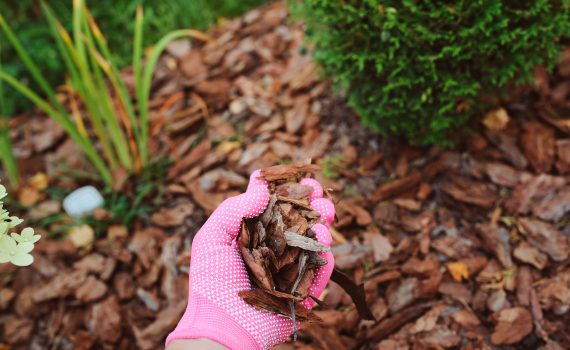You’ve probably heard that mulch is important to your landscape. Have you ever thought about why that is? Apparently lots of people have thought about it, and so much that the phrase “the magic of mulch” has gained popular use. Don’t believe me? Google it.
Why did “the magic of mulch” become a thing, instead of “the utility of mulch” or ”the practicality of mulch”? Probably because what mulch does is pretty whimsical and impressive, really. But before we go into that, what do people use as mulch?
Basic Mulch Types
When you’re looking for mulch, you’ll find that you have three basic category types: organic, mineral, or synthetic. Organic mulch can be shredded hardwood, bark based, coconut coir, wood chips, corn husks, leaf litter, and other natural plant materials. Mineral mulch includes pea gravel, crushed brick, volcanic rocks, marble chips, and shale. Synthetic mulch can be shredded rubber, black plastic sheeting, and landscape fabric. Sometimes synthetic mulches are layered under organic or mineral mulches.
Mulch and the Microbiome
Mineral and synthetic mulches do something good for the miniscule life in your soil: they keep it cool and moist. But organic mulches offer more than that: they contribute new nutrients and living microbes to the rich and bustling microscopic life in the soil. Within soil there are fungus, bacteria, nematodes, algae, earthworms, ants, centipedes, millipedes, beetles, snails, and slugs, all sharing a balanced ecosystem. Organic mulch supports and contributes to that. If your soil were not vibrant with life, your trees, shrubs, and grass wouldn’t be either.
Mulch and Water
All types of mulch reduce evaporation of water from the soil. Water is crucial to your healthy garden and trees. Not only do the plants themselves need water, but so do soil-dwelling microbes and tiny animals like ants and worms. This water retention becomes especially important during hot or dry spells or in hot or dry climates. There is no danger that using mulch will keep your soil too wet, mulch brings water management benefits and no drawbacks.
Mulch and temperature
Part of the magic of mulch is that it keeps soil and roots warmer in cold weather and cooler in hot weather. It has an insulating property that brings the soil below it closer to middle ground temperatures by reflecting away heat and retaining the warmer ground temperatures when cold hits. Almost all areas experience either hot summers or cold winters, if not both. This makes mulch’s insulatory magic useful everywhere.
Mulch and Your Trees
Mulching your trees is pretty easy, and yields great benefit for the tree. What you don’t want is to under-mulch or over-mulch. No sparse see-through layers and no grand mulch volcanoes with your tree trunk erupting out.
Keys to mulching your tree well:
- Remove grass and weeds within the “drip line”, area under the thickest parts of the tree canopy
- If there’s old mulch, rake it to make sure it’s not compacted
- Add about 3 inches depth of fresh mulch covering the “drip line”
- Make sure the flare of the trunk (where it widens above meeting the ground) is fully above the mulch-line. No mulch should be against the trunk or within the first few inches.
If you have questions or need suggestions about mulch, contact Sexy Trees.
 Bringing Sexy Back Into Your Yards
Bringing Sexy Back Into Your Yards 
